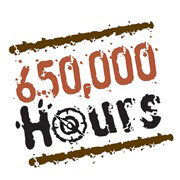by Ken Budd
Ann with a fellow student in Ecuador.
Twelve words in a Bill Bryson book changed my friend Ann’s life.
Ann was 34, living in her native England, and bored by her job as an office manager for a government contractor. Then she read Bryson’s book on the origins of the universe, A Short History of Nearly Everything. On page two of the introduction, Bryson makes a startling statement: “Even a long human life,” he writes, “adds up to only about 650,000 hours.”
That number shook her. And she had a workplace epiphany. She was in a meeting, she looked around the room, and thought…Why am I giving you lot one of my hours? So she went back to school, she studied ecology and wildlife conservation, and she traveled to South America, romping around the rainforest with a university research team—all because of that number: 650,000 hours.
We don’t get much time on this lovely planet. And the older I get, the more I realize it. I’ve become more conscious of squandered hours—of frittering away minutes like pennies, spending time without thought. Recently I caught myself slumped in the Barcalounger watching Match Game on a retro TV channel. That’s right: I was watching a game show from 1978. And as an ascot-clad Charles Nelson Reilly puffed his pipe and harrumphed double-entendres onscreen I thought…Is this really the best use of my time?
“Living life to the fullest” can seem daunting. We think a life of passion means plummeting from planes or scaling Mount Everest or piercing body parts that shouldn’t be pierced. But relishing our 650,000 hours is as simple as savoring the planet’s many gifts. So my advice for you—for all of us—is this:
Stare less at your phone and gaze more at the world. I’ve seen pedestrians so phone-focused they don’t check traffic—and nearly become hood ornaments on FedEx trucks. Let’s lose our electronic self-absorption and take time to marvel at the Earthly goodies that surround us: to dog watch, people watch, cloud watch, star watch. In a vast, expanding universe, this is the only planet we know that has pizza. And babies. And cocker spaniels. And foosball. In the words of the great American philosopher—Ferris Bueller—“Life moves pretty fast. You don’t stop and look around once in a while, you could miss it.”
Live better by giving. Over the course of three comfort-zone-busting years, I volunteered in six countries, from a Costa Rican school to a scientific project in Ecuador (which is where I met Ann). In my travels, the most content, most centered, most satisfied people I met were those who’d dedicated their lives to others. Generosity can lower your blood pressure and heart rate, reduce stress levels, and even boost your longevity, studies have found. So give to family, to friends, to strangers, to enemies. To quote my father, success comes from helping others succeed.
Follow your passion, even if it scares you. No one wants their life defined by the things they didn’t do. The best way to learn about yourself—and about others—is to escape your bubble of familiarity. “My advice to anyone thinking about a career or lifestyle change is to make sure you are passionate about what you want to do,” says Ann. “That excitement will carry you through the emotional and financial tough times. Without it, you can’t possibly take the terrifying first steps.”
After a “decade of transformation,” as she calls it, Ann, now 44, is pursuing her PhD at the Bournemouth University and conducting research at Poole Harbour in Southern England, studying the impact of “green macro-algal mats on the invertebrate community in intertidal mudflats and whether it’s affecting the wintering wading bird population.”
And yes, she loves it.
Ann's idea of fun? Conducting research in the mudflats of Southern England.
“Over the last three years I’ve been stuck in mud up to my waist, collected samples in howling wind and rain, sieved mud, picked out worms, counted the number of times a bird swallows, and filled my freezer with seaweed,” she says, joyfully.
Here’s hoping we find mudflats of joy in our own lives. “Ultimately those 650,000 hours—or however many you are given—are yours,” says Ann. Let's make them count.
Ken Budd is the host of 650,000 Hours, a web series launching in 2016. He is the author of the award-winning memoir The Voluntourist and his writing credits include The New York Times, National Geographic, Smithsonian, The Washington Post, and The Chicago Tribune.
Click here to subscribe to the 650,000 Hours blog. And please like our Facebook page!



